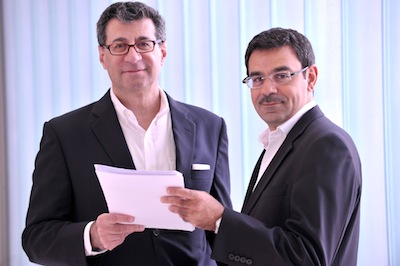Early success for new biomedical research lecture series
March, 2013

Dr. David Hajjar, professor of biochemistry at WCMC-NY, with
Dr. Khaled Machaca, associate dean for research at WCMC-Q
A training course in biomedical research methodologies run by faculty from New York and Qatar has proved a hit with graduate students, postdoctoral fellows and junior faculty.
The course - entitled Concepts in Biomedical Research Methodologies - attracted 166 subscribers, paving the way for the program to be repeated in the near future. Attendees, the majority of whom were Hamad Medical Corporation (HMC) physicians and clinical staff, heard 15 lectures over the course of two weeks on topics such as ethics in research, how to design clinical studies, how to write a scientific paper, the benefits of collaborative research and how to secure funding from the private sector.
Dr. David Hajjar, professor of biochemistry at Weill Cornell Medical College in New York, directed the course, while Weill Cornell Medical College in Qatar faculty members Dr. Ziyad Mahfoud, associate professor of public health, and Dr. Amal Khidir, assistant professor of pediatrics, both delivered lectures. Lectures were also given by Dr. Hajjar and his New York colleagues Dr. Brian Lamon, Dr. Randi Silver, Dr. Curtis Cole and Dr. Lisa Kern.
Dr. Hajjar was encouraged by the level of support for the course.
He said: “I was extremely pleased with the reaction we got to the program. We started out with around 20 trainees from the medical school enrolled on the course, but when more people heard about it, enrollment blossomed to more than 165.
“We plan to offer the course again and to open it up to even more participants, including faculty and students at Qatar University. We want the course to be as inclusive as possible.”
Dr. Hajjar explained that many of the skills taught on the course are essential for ensuring success in research but are generally not addressed by medical degree programs.
“We are teaching skills and imparting knowledge that medical professionals are expected to pick up through experience outside of their formal medical training,” he said. “A medical degree is excellent at teaching the science of our discipline, but it will generally not explain something like how to discover new funding sources for research projects, a skill that can be extremely beneficial to a researcher’s career.”
The first of the course’s three phases began with a lecture entitled Fundamentals of Research Methodology and was followed by four further lectures addressing design of scientific studies, the use of biostatistics in medical research, information technology in research and translational informatics.
Participants then joined a tutorial session to review case studies related to the first five lectures. Lectures 6-9 addressed community-based research, foundations of clinical research and trials, and ethical conduct of research in relation to both humans and animals, before a second tutorial session to review the material.
The final phase of the course consisted of six lectures, covering an analysis of a model scientific paper, the roles of the biotech and pharmaceutical industries in research, a guide to presenting research proposals, how to discover funding sources and the emergence of collaborative science, with the final lecture devoted to a summary of all of the concepts addressed by the program.
Dr. Khaled Machaca, associate dean for research, said: "We are extremely encouraged by the success of the methodologies course, both in terms of its popularity and the value that participants have gained from the subject matter that was taught. Not only does the course strengthen the healthy working relationship that WCMC-Q has with HMC, but it also serves to enhance the rapidly developing biomedical research culture here in Qatar.
"This success gives us the green light to go ahead and develop the course further and spread the benefits to even more medical professionals in Qatar."
